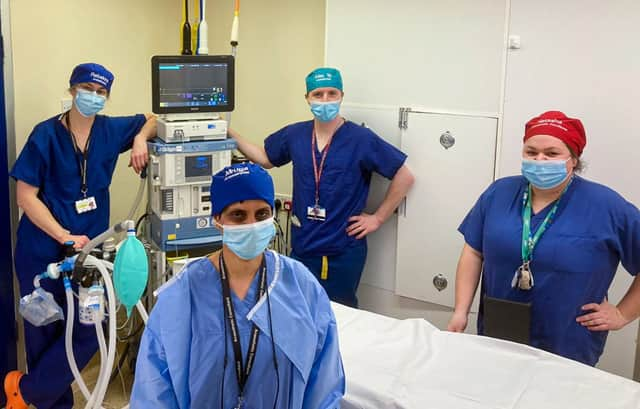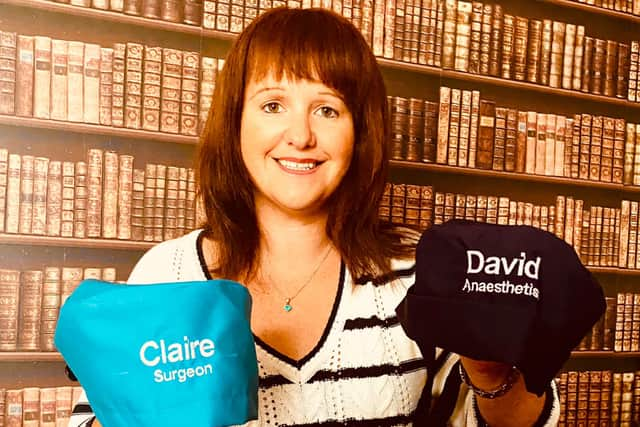Former Merseyside nurse produces innovative hospital eco-wear to help prevent errors


A former nurse from Merseyside is helping revolutionise communication in hospital theatre departments through specially designed eco-friendly headwear.
Her reusable caps have the names and roles of theatre staff on the front so they can be easily identified.
Advertisement
Hide AdAdvertisement
Hide AdMembers of the public have sometimes been mistaken for medical staff dressed in scrubs, according to cap creator Danielle Checketts.
She told LiverpoolWorld: “I’ve spoken to members of the public who were in theatre, for example fathers at the birth of their child, who have been asked to help because staff didn’t know who they were.”
Ms Checketts, who trained and worked at Aintree University Hospital and the Royal Liverpool University Hospital before becoming a medical sales consultant and setting up her own company, believes the new reusable caps will also have environmental benefits.
On average, a typical hospital will discard over 100,000 of the current disposable viscose theatre caps per year.


Advertisement
Hide AdAdvertisement
Hide AdThe caps are being used at Royal Liverpool University Hospital and Liverpool University Hospitals NHS Foundation Trust (LUHFT) believes the cloth caps will save the Trust over one tonne of clinical waste each year.
Why were the caps developed?
Ms Checketts, a managing director at Warwick Med, which produce the caps, identified that as a result of the COVID-19 pandemic and the need for healthcare staff to wear increased levels of personal protective equipment (PPE), it wasn’t as easy for them to recognise each other – especially in a complex theatre environment, where colleagues from a range of roles can be dressed similarly.
The caps now make it easier to identify specific individuals. Patients can better identify who is caring for them and medics can quickly recognise colleagues working in fast-paced emergency scenarios, such as resuscitation.
Ms Checketts, who now lives in the West Midlands, told LiverpoolWorld: “I’ve spoken to staff and the issues they have been sharing have been quite scary with many not being able to identify who each person is in the theatre team, particularly during the pandemic.
Advertisement
Hide AdAdvertisement
Hide Ad“Having named caps should also help patients, because unfortunately you may also have some staff who might not want to be recognised.
“A neonatal matron told me she gave a thumbs down sign to a father who thought his baby was okay, when the child was actually dying. She thought she was giving the signal to one of the doctors. It was devastating for all those involved.
“You might also have other people who are not trained medics in theatre who might be mistaken for clinicians.”
The former nurse has been engaging with patients through feedback forms over the past year and a half and has been collating case studies.
Advertisement
Hide AdAdvertisement
Hide AdShe said: “I have been working on this every day and realise the importance of what is going on and the complexity involved in a theatre environment.”
Which hospitals are using the caps?
The caps are currently being used at Liverpool University Hospitals NHS Foundation Trust (LUHFT) and at hospitals across the Midlands and in Middlesbrough.
Ms Checketts said the University of Birmingham is currently testing a modified version of the hat which she is hoping could be rolled out across the UK.
How are the caps cleaned?
The caps are currently laundered in the same ways as scrubs and staff can have more than one cap which can be rotated.
What’s been said?
Advertisement
Hide AdAdvertisement
Hide AdDr Mruga Diwan, consultant anaesthetist at Liverpool University Hospitals, has been involved in implementing the reusable caps.
She said: “The use of reusable named theatre caps enables better communication, and since wearing our own personalised caps we have noticed an improvement not only between staff engagement, but also for our patients.
“We can all look very similar in our theatre gowns and PPE, so patients now know exactly who they are interacting with, which allays any anxiety and improves their experience. The environmental benefits are also a massive bonus for us all.”
Ms Checketts and her team have been nominated for a start-up business award and are due to attend a ceremony in Nottingham later this month.
Advertisement
Hide AdAdvertisement
Hide AdShe added: “It’s great to see the caps having such a positive impact. For me personally, I remember when I had a caesarean section it was quite overwhelming to understand who everyone was around me.
“By having personalised caps, it enhances the patient experience as they feel more informed and can better understand who is around them in a situation where they can often feel vulnerable.”
Comment Guidelines
National World encourages reader discussion on our stories. User feedback, insights and back-and-forth exchanges add a rich layer of context to reporting. Please review our Community Guidelines before commenting.